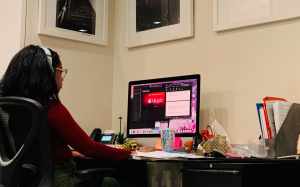
College assignments. Debate team. Part-time barista. Mona Salama has a lot on her plate while still trying to make room for her unpaid internship.
“I need the experience,” says Salama. “It’s frustrating realizing that I’m devoting hours a day to a company and not getting paid, but this is me getting my foot in the door.”
Aside from being a sophomore in John Jay College of Criminal Justice where she takes four courses, Salama works part-time at a nearby Starbucks. Since her internship as a legal assistant does not pay, she took the job as a means of making ends meet. However, being a barista seems miles away from her career path.
“Getting free coffee is important, but I’m a law student and I need to be in that kind of environment,” says Salama. “If it wasn’t because this opportunity is a stepping stone to one day becoming a lawyer, I probably would never intern for free.”
Even with a part-time job on top of a busy schedule, Salama isn’t able to turn down an unpaid internship because it is a gateway to her career–the same is true for many college students. When that stepping stone is unpaid, students must decide if they can afford the responsibility that does not come with a paycheck. Laboring for free becomes a privilege of the middle and upper classes in that context.
A 2019 student survey report by the National Association of Colleges and Employers found that there are fewer options available to students of color, women and first-generation students in terms of paid internships. And in a similar study, the NACE cited that diverse fields like journalism, marketing and social work were more likely to have unpaid internship applications than those dominated by white males, such as IT, business and computer science.

Unpaid internships are more common among students because paid internships are highly competitive and highly sought-after, says Hunter College career coordinator Amy Robbins. “I explain to students that the real value in taking an unpaid internship is the work experience, the specific skills acquired, and the professional connections made,” says Robbins.
Full-time NYU student Lauren Cheung, 21, who rents a shared apartment in Manhattan, says that interning as an editorial assistant for $25 a day came at a high cost. “I was paid a stipend that on most days didn’t cover food and transport; I barely broke even,” says Cheung. “I would have liked to have been paid at least minimum wage because sometimes it’d cost more to go into work than if I had just stayed home.”
After studying long hours towards their undergraduate degree, Cheung had little motivation to step into the office of their internship after a full day. “I believe that interns that work with a monetary incentive may turn out better quality work,” says Cheung. “When it comes down to it, I’m not so sure that doing menial labor for a loss will keep the lights on and the water running.” They were grateful to have had some money saved from previous jobs, otherwise, they could not take on such a poorly paid position.
In spite of the fact that many young adults take unpaid internships as a way to advance their careers, many realize the opportunity wasn’t worth it.
Twenty-three-year-old waitress Jessica LaVopa, who recently graduated from SUNY Purchase with her bachelor’s in journalism, found it extremely difficult to juggle school, a job, and an unpaid internship at a public relations firm. It often crossed her mind how much more she should be getting for her labor. “I loved my internship, but when I wasn’t getting paid, I thought, ‘Damn,’ I deserve more than this,” says LaVopa. “The experience and knowledge that companies require from an intern are qualities that make up an employee with a salary and I wasn’t getting anything.”
Desperate to start working in her field, LaVopa took on a writing internship while waitressing at night and doing secretary work in a real estate office on weekends. “I was overloaded with work but needed the money and the experience,” says LaVopa. Who admits that having an extra duty with no pay was extremely stressful and futile. “I actually lost money every time I went to the internship. It didn’t cover my three-hour commute from Long Island,” says LaVopa.
According to career adviser Robbins, not many students turn down unpaid internships since they can take them as a class credit–this may make it easier for them to handle not getting paid.
“It is surprising to me that I haven’t heard any comments or complaints about unpaid work,” says Robbins. “We have to remember that the student wouldn’t have any way to get into this new role, make connections, gain experience, etc. if they weren’t doing it through the internship. This is quite valuable.”









